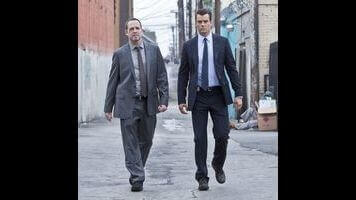Battle Creek is also the next step in the evolution of the Tiffany Network cop show. CBS continues to pull new programming from its alphabet soup of CSIs and NCISes, but it’s also found success in shows that mix personality with procedure: first Person Of Interest, then Elementary. Battle Creek has personality in abundance, from the multi-cultural bullpen whose detectives sound like they were named on a dare (including Edward Fordham Jr. and Damon Herriman as officers Funkhauser and Niblet, respectively) to the gleaming space-age surfaces of FBI Special Agent Chamberlain’s Battle Creek field office. Well-groomed hot shot Milt winds up in Cereal City USA after an undisclosed bit of business in Detroit, and questions about what happened there serve as Battle Creek’s mysterious, pink-teddy-bear-like through-line.
There’s no mystery about how Detective Agnew feels about the new guy in town, though. Russ hates everything about Milt—his sunny disposition, his high-tech crime-fighting tools, the fact that he chose to partner with Agnew on his first day in Battle Creek—and Winters is given no shortage of ways to express this distaste. Putting a brainier spin on his usual dirtbag-with-a-heart-of-gold routine, Winters is in the Dr. House seat here, the skeptic whose every life experience has placed an emotional barrier between the detective and those closest to him. At times, it appears that getting through to Russ is the primary objective of Milt’s new assignment—though if that were the case, there ought to be more of a spark between the small-town dick and Dale Cooper Lite.
The anti-buddy-cop angle is Battle Creek’s raison d’être, but it’s never as interesting as the local goings on that begin to unfold around episode six, which introduces a perfectly cast Patton Oswalt as the city’s embattled mayor. (In a somewhat unprecedented move for a network show, critics were able to screen all of Battle Creek’s first season prior to the series premiere.) While there are medium-level thrills in the show’s cases of the week, the real intriguing stuff comes from what Shore and team pack around those cases. The characters have lives and relationships and stories outside of the precinct, but the city appears to have some sort of story, too. There’s a purgatorial feel to the way characters can’t seem to break their hometown’s grip: Big fish in small ponds like Oswalt’s Mayor Hardy, but also Danny (Rotimi), the troubled adopted son of police commander Guziewicz (Janet McTeer), whose addictions set him on a roundabout path back to Southern Michigan. And then there’s Milt, sent to Battle Creek to atone for some unnamed transgression.
That’s where Battle Creek displays its true parentage: If their best-known works say anything about Gilligan and Shore, the former is fixated on personal transformation, while the latter prefers characters for whom change is either impossible or in the rearview mirror. The partnership of Agnew and Chamberlain might establish a middle ground between their investigative strategies, but whatever shifts they make will come in incremental, built-to-last fashion. (For example, the first season is well under way before Milt gets a straight answer about Russ’ feelings for a co-worker.) Vince Gilligan had artful and game-changing TV ahead of him, but the Vince Gilligan who wrote Battle Creek was also a broadcast-network jobber whose not-ready-for-primetime X-Files spin-off, The Lone Gunmen, lasted only 13 episodes at Fox. There are bigger ambitions within Battle Creek’s pilot and the episodes that follow it, but there’s also an accessible procedural engine that a showrunner like Shore can maintain for maximum mileage. Think of Battle Creek not as Milt’s tricked out FBI SUV or Russ’ dying compact, but as the car Gilligan once gave Walter White: Reliable, kind of dorky and a little bit funky, Battle Creek is the Pontiac Aztek of cop shows.

 Keep scrolling for more great stories.
Keep scrolling for more great stories.
